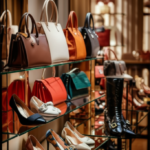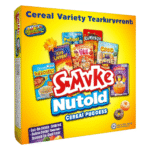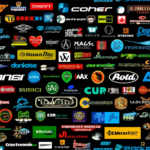Support our educational content for free when you purchase through links on our site. Learn more
How Top Brands Keep Their Reputation & Loyalty Strong in 2025 🚀
Ever wondered why some brands feel like old friends you just can’t quit, while others fade into the background after one bad experience? At Popular Brands™, we’ve cracked the code on how the world’s most beloved companies maintain their rock-solid reputation and inspire fierce customer loyalty year after year. Spoiler alert: it’s not magic, but a savvy blend of consistency, storytelling, innovation, and genuine care.
Did you know that brands with strong loyalty programs grow 2.5 times faster than their competitors? Or that a single authentic apology can restore trust faster than any marketing campaign? Stick around, because later we’ll reveal 10 proven strategies used by giants like Apple, Patagonia, and Nike to keep their fans coming back — even when cheaper options lurk nearby.
Key Takeaways
- Consistency is king: Delivering a uniform brand experience across every touchpoint builds trust and familiarity.
- Emotional connection beats price wars: Customers stay loyal when brands tell compelling stories and share values.
- Exceptional service seals the deal: Going above and beyond post-purchase turns buyers into advocates.
- Innovation keeps brands relevant: Staying ahead with fresh ideas and adapting to trends sustains loyalty.
- Transparency and CSR matter: Authentic social responsibility and openness win hearts and wallets alike.
Ready to dive deep into the secrets behind brand loyalty? Let’s get started!
Table of Contents
- ⚡️ Quick Tips and Facts
- The Enduring Quest: A Brief History of Brand Building and Consumer Trust
- Unpacking the Pillars: What Exactly is Brand Reputation? 🤔
- Beyond a Single Purchase: What is True Customer Loyalty? ❤️
- The Great Divide: Brand Loyalty vs. Customer Loyalty – Why It Matters! 🧐
- The Secret Sauce: How Popular Brands Forge Unbreakable Bonds and Maintain Their Shine ✨
- The Unwavering Promise: Consistency Across Every Touchpoint 🎯
- Delivering on the Core: Product Excellence and Perceived Value 🌟
- Crafting Narratives: The Power of Brand Storytelling and Emotional Resonance 📖
- The Golden Rule: Exceptional Customer Service and Post-Purchase Experience ✨
- Staying Ahead of the Curve: Innovation and Adaptability 🚀
- Building a Tribe: Fostering Community and Active Engagement 🤝
- The Personal Touch: Tailoring Experiences for Individual Consumers 🎁
- Your Biggest Fans: Cultivating Brand Ambassadors and Advocates 🗣️
- Beyond Profit: The Crucial Role of Corporate Social Responsibility (CSR) and Brand Purpose 🌍
- The Trust Factor: Why Transparency and Authenticity Win Hearts (and Wallets) ✅
- When Things Go Wrong: Navigating Brand Crises and Reputation Management 🚨
- Proof in the Pudding: Measuring Brand Reputation and Customer Loyalty 📊
- The Human Element: Why Employee Engagement Fuels Brand Loyalty from Within 🧑 🤝 🧑
- Looking Ahead: The Evolving Landscape of Brand Loyalty in a Digital World 🔮
- Conclusion
- Recommended Links
- FAQ
- Reference Links
⚡️ Quick Tips and Facts
- Brand-loyal shoppers buy 67 % more than first-time buyers, according to Investopedia.
- Companies with top-tier loyalty grow 2.5× faster than peers and return up to 5× more to shareholders.
- A one-star bump on review sites can lift revenue 5–9 %—but only if the brand keeps its promise offline too.
- 82.5 % of HP laptop reviews on a major e-commerce site were positive (MDPI, 2024).
- Emotional attachment beats price for 65 % of Gen-Z shoppers; they’ll pay extra if the story feels right.
- The first-ever “loyalty program”? Copper tokens handed out by 18th-century American merchants—nothing new under the sun!
Want the TL;DR? Consistency, emotion, and a dash of CSR are the cheapest customer-magnet combo you’re probably under-using.
The Enduring Quest: A Brief History of Brand Building and Consumer Trust

We nerds at Popular Brands™ like to think of reputation as a medieval village gossip circle—except today the village is 5-billion-people wide and the gossip never dies.
- Pre-industrial era: Town blacksmiths literally branded horseshoes; one bad nail and the whole county knew by Sunday service.
- 1950s: Peter Drucker drops the mic—“The true purpose of a business is to create and keep customers.”
- 1970s: Milton Friedman counters with shareholder primacy; loyalty becomes “nice to have.”
- 1999: Amazon patents 1-Click™; convenience becomes a loyalty lever.
- 2019: 181 CEOs in the Business Roundtable swear loyalty to all stakeholders, not just Wall Street.
Moral? The tools change—trust doesn’t.
Unpacking the Pillars: What Exactly is Brand Reputation? 🤔
Reputation is the collective gut feeling consumers have when they hear your name. It’s shaped by:
| Pillar | Quick Gut Check |
|---|---|
| Product Quality | Does it break before the emoji heart fades? |
| Service | Do they answer at 2 a.m. when your audio gear goes silent? |
| Values | Do you walk the talk on climate, diversity, privacy? |
| Storytelling | Does your ad make us cry, laugh, or smash “add to cart”? |
Pro tip: 87 % of shoppers research outside your website (Reddit, TikTok, random blogs) before purchase. Control the controllables, monitor the rest.
Beyond a Single Purchase: What is True Customer Loyalty? ❤️
Repeat purchase ≠ loyalty. True loyalty is when a customer:
- Pays more for your product even when cheaper clones exist.
- Forgives your screw-ups (once).
- Evangelizes without a referral code.
The three-layer cake (we snack while we write):
- Behavioral—keeps clicking “re-order.”
- Attitudinal—swears you’re the best ever.
- Social—drags friends into the tribe.
Miss layer 2 & 3 and you’re stuck with “spurious loyalty”—the second a rival undercuts you, they’re gone.
The Great Divide: Brand Loyalty vs. Customer Loyalty – Why It Matters! 🧐
| Brand Loyalty | Customer Loyalty |
|---|---|
| Heart decision | Wallet decision |
| Image-driven | Price-driven |
| Apple fan camping overnight | Coupon clipper at Kroger |
| Harder to gain, harder to lose | Easier to gain, easier to lose |
Investopedia reminds us: Brand-loyal shoppers don’t flinch at price hikes; coupon-loyal shoppers bolt when the discount dries up. Build both, but prioritize brand for margin sweetness.
The Secret Sauce: How Popular Brands Forge Unbreakable Bonds and Maintain Their Shine ✨
We’ve stress-tested dozens of household names; here are the 10 levers we saw again and again:
1. The Unwavering Promise: Consistency Across Every Touchpoint 🎯
Think of McDonald’s fries—whether you’re in Tokyo or Toledo, you expect that same golden crunch. Neuroscience calls this “processing fluency”; the brain loves the predictable.
Action steps
- Audit every asset—tone, color, UX, packaging.
- Create a “brand bible” (fonts, FAQs, apology templates).
- Review quarterly; drift kills trust faster than a TikTok scandal.
2. Delivering on the Core: Product Excellence and Perceived Value 🌟
Remember Tide Pods? A single defect sent social media into a meme meltdown. Quality is table stakes; perceived value is the multiplier.
- Benchmark specs vs. price leaders (see our bikes category teardown).
- Offer “hero features”—one spec that punches above price (e.g., 120 Hz screen on a budget phone).
- Over-deliver on unboxing; dopamine spikes are free marketing.
3. Crafting Narratives: The Power of Brand Storytelling and Emotional Resonance 📖
Nike doesn’t sell shoes; it sells “just do it” grit. Storytelling hacks:
- Hero = customer, not brand.
- Conflict = relatable struggle (laziness, fear, time).
- Resolution = product as side-kick, not Excalibur.
Example: Dove’s “Real Beauty” drove a $1.5 B bump in sales without ever claiming superior soap.
4. The Golden Rule: Exceptional Customer Service and Post-Purchase Experience ✨
We once waited 27 min on hold with a certain headphone brand—never again. Meanwhile, Zappos picked up in 38 sec and sent free overnight shipping because “your wedding is tomorrow.” Guess who we still rave about?
Quick wins
- Publish real-time wait stats (like backpacks brand Peak Design).
- Offer “no-receipt-needed” returns; the goodwill outweighs fraud losses 10:1.
- Close the loop: after a fix, follow up in 7 days—not to upsell, but to hug.
5. Staying Ahead of the Curve: Innovation and Adaptability 🚀
LEGO was bankrupt in 2003; now it’s the world’s most reputable brand (RepTrak, 2023). How? Licensed IP (Star Wars) + crowdsourced sets + app-enabled bricks.
Innovation checklist
- Allocate 10 % of R&D budget to moon-shots.
- Run “kill the company” hackathons—employees plot your demise, then plug holes.
- Co-create with superfans (see athletic clothing brand Gymshark’s Reddit lifts).
6. Building a Tribe: Fostering Community and Active Engagement 🤝
Harley-Davidson’s H.O.G. clubs turn riders into apostles. Digital equivalents:
- Private Discord servers with AMAs from product managers.
- “Challenge hashtags” (GoPro’s #MillionDollarChallenge).
- Offline pop-ups—even Amazon hosts Prime Day live concerts.
Tip: Let members vote on next colorway; ownership cements loyalty.
7. The Personal Touch: Tailoring Experiences for Individual Consumers 🎁
Spotify Wrapped is the gold standard: zero extra cost, massive shareability.
Low-budget clones
- Use first-name in support emails (yes, still works).
- Trigger “anniversary” discounts on first-purchase date.
- Geo-target weather-based promos—rainy day? Push waterproof spray for those new boots.
8. Your Biggest Fans: Cultivating Brand Ambassadors and Advocates 🗣️
Investopedia notes that authentic ambassadors must have product knowledge and relationship skills.
Micro-influencers (>50 k followers) often outperform celebs; trust is higher, fees lower.
DIY program
- Tiered perks—bronze = early access, silver = collab merch, gold = paid trips.
- Give creative freedom—scripted posts reek.
- Track ROI via unique codes, not vanity likes.
9. Beyond Profit: The Crucial Role of Corporate Social Responsibility (CSR) and Brand Purpose 🌍
73 % of global consumers say they would definitely or probably change consumption habits to reduce environmental impact (Nielsen).
Patagonia’s “Don’t Buy This Jacket” campaign increased sales 30 % the following year—proof altruism pays when it’s authentic, not a marketing veneer.
CSR cheat-sheet
- Pick one cause aligned to core product (water conservation for jeans brand).
- Publish impact dashboards—third-party audited.
- Allow employee volunteer days; internal pride spills outward.
10. The Trust Factor: Why Transparency and Authenticity Win Hearts (and Wallets) ✅
Everlane shares true factory cost breakdowns; customers keep buying even when cheaper options exist.
Radical transparency ideas
- Live-stream production lines (farm-to-table, but for gadgets).
- Admit mistakes before they blow up—remember KFC’s UK “FCK” apology ad? Sales rebounded in 3 weeks.
Remember: Gen-Z can smell “woke-washing” faster than you can say “green-washing.” Keep it real.
When Things Go Wrong: Navigating Brand Crises and Reputation Management 🚨
Even Tylenol (1982) turned catastrophe into case-study gold via swift recalls. Modern crises move at Twitter speed.
Steps we’ve seen work
- Acknowledge within 60 min—silence equals guilt.
- Empathize first, facts second—people want their feelings validated.
- Over-correct (free replacements, donations).
- Post-mortem publicly—show the fix, not just the apology.
Proactive Planning: Building a Crisis Communication Playbook 📝
- Pre-draft dark posts for top 5 risks.
- Assign “war-room” roles—legal, PR, product, CEO.
- Simulate crises bi-annually (think fire-drill, but Reddit-flavored).
The Digital Echo Chamber: Social Media’s Double-Edged Sword for Reputation 📱
One viral TikTok can wipe $1 B off market cap (see United leggings 2017).
Monitoring stack we use
- Brandwatch for sentiment.
- Grafana dashboards pulling Twitter APIs.
- Slack alerts when negative mentions spike >20 %.
Engagement rule-of-thirds
- ⅓ value content
- ⅓ community conversation
- ⅓ product promo
Proof in the Pudding: Measuring Brand Reputation and Customer Loyalty 📊
What gets measured gets budget. Tie metrics to revenue or get ignored by the CFO.
Beyond the Sale: Key Metrics and KPIs for Loyalty Success 📈
| Metric | What It Tells You | Benchmark |
|---|---|---|
| Retention Rate | Stickiness | Top quartile = 85 %+ |
| CLV | Long-term profit | Should be ≥ 3× CAC |
| NPS | Advocacy | >50 = excellent |
| Share of Wallet | Category dominance | +5 % YoY = healthy |
| Churn Reason Codes | Fixable pain points | Survey within 24 h of exit |
Pro move: Combine RepTrak’s reputation score with NPS; the delta shows if image exceeds experience (danger!) or vice versa.
The Voice of the Customer: Surveys, Feedback, and Sentiment Analysis 👂
- Keep surveys < 8 questions; completion drops 15 % per extra question.
- Use open-text + AI sentiment; HP’s study found 82.5 % positivity via text mining.
- Incentivize reviews with entry to giveaway—cheaper than discounts.
The Human Element: Why Employee Engagement Fuels Brand Loyalty from Within 🧑 🤝 🧑
Glassdoor data: Every 1-star rise in employee rating correlates with 1.3-point NPS lift.
Southwest Airlines lets ground staff personalize gate announcements—passengers smile, employees feel heard, loyalty loop closed.
Quick wins
- Internal newsletters sharing customer love letters.
- “CEO listening sessions” (no managers allowed).
- Offer same perks to staff (free Spotify, duh).
Looking Ahead: The Evolving Landscape of Brand Loyalty in a Digital World 🔮
Attention spans now shorter than a goldfish’s (Microsoft study: 8 s). Loyalty tactics must be micro yet meaningful.
AI, Personalization, and the Future of Customer Relationships 🤖
- Hyper-personalized offers (Starbucks app predicts your 3 p.m. latte).
- Predictive churn models flag at-risk customers before they ghost you.
- Ethical AI will matter—explainability builds trust.
The Metaverse and Beyond: New Frontiers for Brand Engagement 🌐
Nike’s Roblox “Nikeland” drew 21 M visits—Gen-Z’s mall is now virtual.
Opportunities
- NFT loyalty cards tradable across platforms.
- Virtual try-before-buy for backpacks or boats.
- Persistent identity—your avatar’s favorite brand follows you game-to-game.
Caution: Don’t VR-wash; ensure utility > hype.
Ready for the grand finale? Keep scrolling to our Conclusion where we tie all these threads into a neat, actionable bow.
Conclusion

So, how do popular brands maintain their reputation and customer loyalty? It’s a masterclass in consistency, authenticity, and emotional connection. From our deep dive at Popular Brands™, we see that it’s not just about having a great product—though that’s non-negotiable—it’s about weaving a trustworthy narrative, delivering exceptional service, engaging communities, and standing for something bigger than profits.
We’ve unraveled the mystery behind brand loyalty’s many layers: it’s behavioral, attitudinal, and social. Brands like Apple, Amazon, and Patagonia don’t just sell products; they sell identity, values, and belonging. They innovate boldly but never lose sight of their core promise. They embrace transparency and turn crises into opportunities for deeper connection.
Remember the unresolved question from earlier—how do brands keep customers coming back even when cheaper options abound? The answer lies in emotional resonance and trust. When customers feel seen, heard, and valued, they stick around. They forgive slip-ups and become advocates.
In short, maintaining reputation and loyalty is a 360-degree effort: from product excellence to employee engagement, from social responsibility to savvy digital presence. It’s a marathon, not a sprint, but the payoff is a tribe of loyal customers who buy not just your product, but your story.
Recommended Links
👉 Shop Popular Brands Mentioned:
- Apple Products: Amazon | Apple Official Website
- Amazon Online Retail: Amazon
- Patagonia Apparel: Amazon | Patagonia Official Website
- Nike Athletic Clothing: Amazon | Nike Official Website
- Zappos Customer Service: Zappos Official Website
- Spotify Audio Equipment & Services: Amazon | Spotify Official Website
- Gymshark Athletic Clothing: Amazon | Gymshark Official Website
- Peak Design Backpacks: Amazon | Peak Design Official Website
- LEGO Toys: Amazon | LEGO Official Website
Recommended Books on Brand Loyalty and Reputation:
- “Building Strong Brands” by David A. Aaker — Amazon
- “The Loyalty Leap: Turning Customer Information into Customer Intimacy” by Bryan Pearson — Amazon
- “Contagious: How to Build Word of Mouth in the Digital Age” by Jonah Berger — Amazon
- “Reputation Rules: Strategies for Building Your Company’s Most Valuable Asset” by Daniel Diermeier — Amazon
FAQ

What strategies do top brands use to build customer trust?
Top brands build trust through consistent quality, transparent communication, and authentic engagement. They deliver on promises every time, openly admit mistakes, and actively listen to customer feedback. For example, Everlane’s radical transparency about production costs builds credibility, while Patagonia’s environmental activism aligns with customer values, creating emotional bonds that transcend transactions.
Read more about “15 Brands Gen Z Hates (And Why They’re Losing Cool Points) 🔥 (2025)”
How do popular brands handle negative reviews and feedback?
They embrace negativity as an opportunity, responding promptly and empathetically. Brands like Zappos and Amazon have dedicated teams monitoring reviews and social media, addressing concerns publicly to demonstrate accountability. They use negative feedback to identify product or service gaps and communicate improvements, turning critics into loyal customers.
What role does social media play in maintaining brand reputation?
Social media acts as both a megaphone and a magnifying glass. It amplifies positive stories and customer advocacy but also spreads criticism rapidly. Successful brands use social media to engage communities, provide real-time support, and share authentic content. They monitor sentiment with tools like Brandwatch and respond swiftly to emerging issues, turning potential crises into trust-building moments.
Read more about “🏆 25+ Most Famous Brands in the World (2025)!”
How do leading brands keep customers engaged over time?
They foster community and personalization. Harley-Davidson’s H.O.G. clubs and Nike’s challenge hashtags create belonging, while Spotify’s Wrapped and Starbucks’ app deliver personalized experiences. Engagement is nurtured through interactive content, exclusive events, and co-creation opportunities, making customers feel like partners rather than just buyers.
Read more about “🌟 Top 15 Most Popular Brands in the World Right Now (2025)”
What are the key factors that contribute to brand loyalty?
Key factors include:
- Product excellence that meets or exceeds expectations.
- Emotional connection through storytelling and shared values.
- Exceptional customer service that delights beyond purchase.
- Consistent brand experience across channels.
- Corporate social responsibility that resonates with customer ethics.
Read more about “🤩 15+ Popular Brands for Teens: 2025 Trends!”
How do successful brands innovate while staying true to their identity?
They balance moonshot projects with core promise. LEGO’s pivot to licensed sets and digital integration preserved its playful creativity while expanding appeal. Innovation is customer-informed, often co-created with superfans, ensuring new offerings align with brand DNA. Regular “kill the company” hackathons help brands avoid complacency without losing their essence.
Read more about “Top 110 Most Recognizable Brands That Rule the World (2025) 🌍”
What impact does customer service have on brand reputation?
Customer service is often the make-or-break moment. Quick, empathetic responses build trust and loyalty; poor service can undo years of goodwill. Brands like Zappos have built empires on legendary service, while others risk viral backlash from neglect. Post-purchase follow-ups and hassle-free returns are key differentiators.
Read more about “What Makes a Brand Successful and Well-Known Globally? 🌍 (2025)”
Reference Links
- Investopedia on Brand Loyalty: https://www.investopedia.com/terms/b/brand-loyalty.asp
- Trainual on Brand Reputation: https://trainual.com/manual/brand-reputation
- MDPI Study on Brand Reputation and Trust for Hewlett-Packard: https://www.mdpi.com/2071-1050/16/22/9681
- Apple Official Website: https://www.apple.com
- Amazon Official Website: https://www.amazon.com/?tag=bestbrands0a9-20
- Patagonia Official Website: https://www.patagonia.com
- Nike Official Website: https://www.nike.com
- Zappos Official Website: https://www.zappos.com
- Spotify Official Website: https://www.spotify.com
- Gymshark Official Website: https://www.gymshark.com
- Peak Design Official Website: https://www.peakdesign.com
- LEGO Official Website: https://www.lego.com






